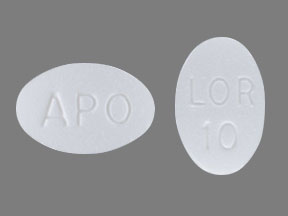
Loratadine Coupons & Savings Card – Discount Prices from $5.95
Generic for: Claritin, Claritin reditabs, Alavert
My prescription
Edit
10MG, Loratadine (30 Tablets)
Select pharmacy

Walgreens
$5.95
COUPON PRICE
Albertsons
$8.04
COUPON PRICELoratadine savings card
Show this card to your pharmacist
Walgreens
$5.95
BIN
ID
PCN
GRP
015995
LHKPW901969
GDC
DR33
Powered by
More prescriptions for allergic rhinitis
More prescriptions for allergic rhinitis
Price history for Allergy Relief (brand) & Loratadine (generic)
30 Tablets, 10MG
Average retail price for Allergy Relief
Average retail price for Loratadine
Average SaveHealth price for Loratadine
Our price history data is based on aggregated prescription data collected from participating pharmacies in America. Our prescription data updates daily to reflect the latest price changes. If you notice a missing data point, it means there wasn't sufficient data available to generate a monetary value for that date.
We analyzed Loratadine prices for (10MG, 30 Tablets) over the last 12 months. The average retail price was $87.77, while the average price using the SaveHealth discount card was $6.71. That's a savings of approximately 92.36% when using our Loratadine coupon.
Compared to the generic version, Allergy Relief had an average price of $46.15 over the same time period. With the SaveHealth savings card, Loratadine is 85.46% cheaper on average than Allergy Relief.
*Retail prices are based on pharmacy claims data, and may not be accurate when we don't have enough claims.
Loratadine dosage forms
Dosage Quantity Price from Per unit 10MG 30 Tablets $10.46 $0.35 10MG 1 Tablet $9.05 $9.05 10MG 3 Tablets $9.15 $3.05 10MG 5 Tablets $9.24 $1.85 10MG 7 Tablets $9.34 $1.33 10MG 10 Tablets $9.49 $0.95 10MG 14 Tablets $9.68 $0.69 10MG 15 Tablets $9.73 $0.65 10MG 20 Tablets $9.98 $0.50 10MG 28 Tablets $10.37 $0.37
| Dosage | Quantity | Price from | Per unit |
|---|---|---|---|
| 10MG | 30 Tablets | $10.46 | $0.35 |
| 10MG | 1 Tablet | $9.05 | $9.05 |
| 10MG | 3 Tablets | $9.15 | $3.05 |
| 10MG | 5 Tablets | $9.24 | $1.85 |
| 10MG | 7 Tablets | $9.34 | $1.33 |
| 10MG | 10 Tablets | $9.49 | $0.95 |
| 10MG | 14 Tablets | $9.68 | $0.69 |
| 10MG | 15 Tablets | $9.73 | $0.65 |
| 10MG | 20 Tablets | $9.98 | $0.50 |
| 10MG | 28 Tablets | $10.37 | $0.37 |
| 10MG | 50 Tablets | $11.44 | $0.23 |
| 10MG | 60 Tablets | $11.93 | $0.20 |
| 10MG | 90 Tablets | $19.79 | $0.22 |
| 10MG | 100 Tablets | $20.33 | $0.20 |
| 10MG | 300 Tablets | $30.98 | $0.10 |
| 10MG | 500 Tablets | $41.64 | $0.08 |
| 10MG | 1000 Tablets | $66.80 | $0.07 |
| 10MG | 3000 Tablets | $164.40 | $0.06 |
| 10MG | 9000 Tablets | $457.20 | $0.05 |
